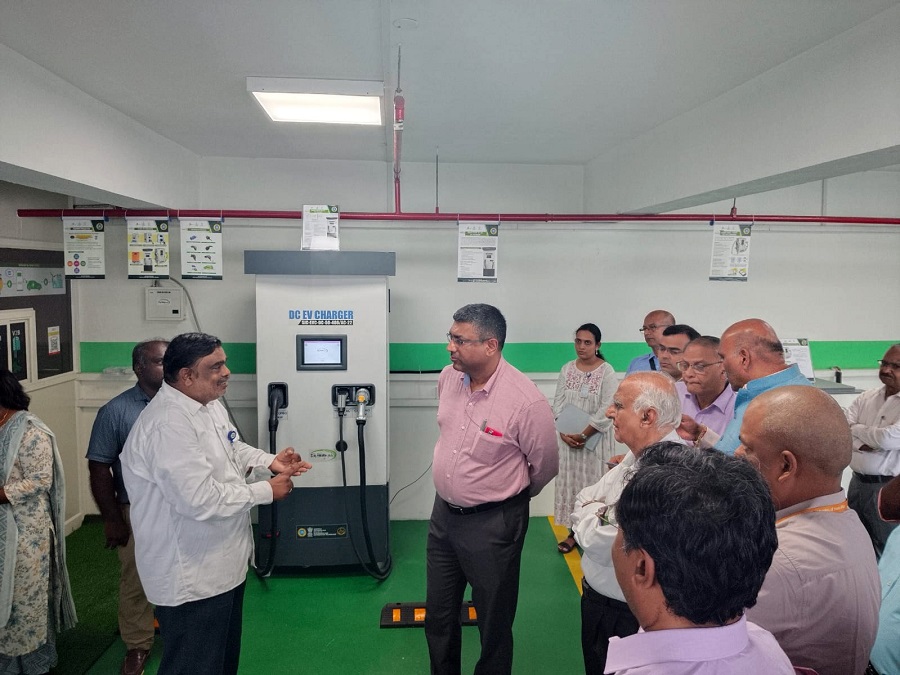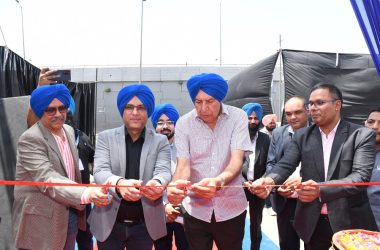C-DAC Launches Advanced EV Charging Station and Hardware Emulation Hub, Signs Multiple MoUs to Boost Indigenous Tech Development
In a significant push toward indigenous technology development, the Secretary of the Ministry of Electronics and Information Technology (MeitY), S. Krishnan, inaugurated a cutting-edge Electric Vehicle (EV) Charging Station and Hardware Emulation Facility at C-DAC Thiruvananthapuram, located within the Technopark Campus. These initiatives are set to accelerate the growth of India’s EV ecosystem and hardware innovation, reinforcing the country’s push toward self-reliance in critical technology sectors.

The newly launched EV charging station is equipped with a variety of AC and DC fast chargers capable of serving vehicles ranging from two-wheelers to heavy-duty trucks. This facility is poised to play a pivotal role in the research, development, and commercialization of indigenous EV charging technologies, bolstering the manufacturing sector through collaboration with various industries.
Additionally, the Hardware Emulation Facility inaugurated on the same day is tailored to support start-ups under the C2S program and the Design-Linked Incentive (DLI) Scheme of MeitY. This center will focus on the development, testing, and validation of hardware designs for Very Large Scale Integration (VLSI) and System on Chip (SoC) technologies. The facility offers resources for emulating hardware designs on reconfigurable platforms like Field-Programmable Gate Arrays (FPGAs), a critical component for advancing India’s technological capabilities.
Speaking at the event, S. Krishnan emphasized the importance of creating intellectual property within India for industrial applications. “We must have the ability to develop crucial technologies independently to ensure India remains at the forefront of innovation,” he stated. He also highlighted the government’s commitment to promoting Electric Vehicles and renewable solutions, noting that advancements in these areas will play a key role in making India self-sufficient.
The event also saw a series of strategic announcements aimed at enhancing collaboration between C-DAC and industry partners:
- Transfer of Technology: C-DAC Thiruvananthapuram, in partnership with IISc Bangalore, transferred its high-voltage, high-frequency planar magnetics technology to Reliamotive Labs, Bangalore. This technology is capable of designing and testing planar inductors and transformers for applications up to 10kV and frequencies up to 200 kHz.
- MoU with L&T Semiconductor Technologies: C-DAC signed a Memorandum of Understanding (MoU) with L&T Semiconductor Technologies to develop System on Chips (SoCs) based on the VEGA processor for various applications.
- MoA for Network Security Solutions: A Memorandum of Agreement (MoA) was signed between C-DAC Thiruvananthapuram, C-DAC Chennai, and Aheesa Digital Innovations Pvt. Ltd. to develop network security solutions, including CDAC Rakshak and Darpan Virtual Network Solutions, both of which are designed to enhance India’s cybersecurity infrastructure.
- MoA for Vehicle-to-Grid (V2G) Technologies: An MoA was also signed with Hykon India Ltd. to develop and deploy Vehicle-to-Grid (V2G), Vehicle-to-Home (V2H), and Vehicle-to-Building (V2B) technologies, which are expected to provide grid support, storage solutions for renewable energy, and promote sustainable electric transportation.
- Smart Meter Technologies MoA: Another MoA was signed with JMV LPS for the development and deployment of smart meter technologies under the Advanced Metering Infrastructure (AMI), marking the next evolution of smart metering in India.
- Product Launch: The event also witnessed the launch of Hybrid Power Conditioning Systems for microgrids by Hykon India Ltd., developed in collaboration with C-DAC. These systems are designed to ensure grid synchronization, stability, and resilience in industrial microgrids.
The inauguration and signing ceremonies were attended by key officials from MeitY and C-DAC, as well as representatives from the collaborating industries. This collaborative effort marks a significant milestone in India’s journey toward technological self-reliance and innovation.







